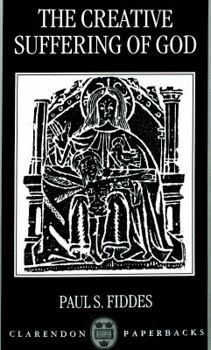The Creative Suffering of God
Select Format
Select Condition 
Book Overview
The theme that God suffers with his world has become a familiar one in recent years, overturning centuries of belief in an impassible deity. This book both surveys recent thought about the suffering of God and proposes future directions for this important area of Christian theology. Fiddes discusses four trends of current thought--the "theology of the cross" in modern German theology as represented in the works of Barth, Moltmann, and J ngel; American...
Format:Hardcover
Language:English
ISBN:0198266863
ISBN13:9780198266860
Release Date:June 1988
Publisher:Oxford University Press, USA
Length:288 Pages
Weight:1.10 lbs.
Dimensions:0.8" x 5.6" x 8.8"
Related Subjects
Christian Books & Bibles Christianity Criticism & Theory European History & Criticism Humanities Language Arts Linguistics Literary Criticism Literary Criticism & Collections Literature & Fiction Religion Religion & Spirituality Religious Studies Theology Words, Language & Grammar World LiteratureCustomer Reviews
1 rating
Analyzing Divine Love
Published by Thriftbooks.com User , 19 years ago
The author surveys recent thought about the suffering of God and, along the way, develops his own ideas of divine suffering. Fiddes notes at the outset that theological statements throughout the history of the church have tended to support a view of God as unmoving, unchanging and unsuffering. Today, however, at least academic theologians emphasize their strong conviction that God does suffer. The author attempts to offer a coherent notion of a God who both suffers and yet can fulfill divine purposes. The view he offers understands God as freely choosing to be self-limited, to suffer change, to be affected by time, and experience death, while remaining the living God. The author is especially influenced by process theological conceptions, but, in the end, the position he takes is his own; it is not in line with "orthodox" process thought. Four major contributions have been made to the present debate about whether God suffers. The first, represented by Jurgen Moltmann, understands the suffering of God as being derived from the theology of the cross. The nature of God is revealed in the cross of Jesus as God participates in human history. A second major contribution comes from American process philosophy. In this vision, every participant, including God, is bound in a network of mutual influences with others. This means that divine suffering becomes central to divine action. The third dominant contribution to the present debate on the suffering of God comes from the mid-20th century "Death of God" theological movement. Finally, those whose sympathies remain with classical theism continue to exert some influence in the debate. "A theology of a suffering God needs to weave all four of these strands into a pattern, or to use another image, it must stand where four ways cross" (15). The chapters in the book explore the four major contributors to the current debate upon divine suffering. In a chapter Fiddes titles, Why Believe in a Suffering God, he proposes four reasons why this theme is especially important in contemporary theology. First, it is difficult to understand what it means to say that God is a loving God if God does not suffer. Second, if the cross of Jesus Christ is central to Christian theology, this implies a notion of a God who is affected by the world and its experiences. Third, the problem of human suffering, itself, calls for a Creator who suffers along with creatures in pain. Finally, the scientific and natural view of existence supports the idea of an interactive deity. I recommend this book. Thomas Jay Oord






